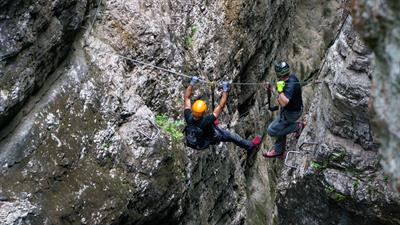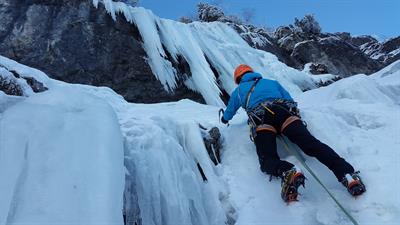PDF chapter test TRY NOW
Consider a typical climb, towards the summit on the last heights. You are sharing a rope with another climber. You firm in. He cuts the steps in the hard ice. Then he belays and you inch your way up. The climb is grim. You strain every nerve as you take every step. Famous climbers have left records of the help given by others. They have also recorded how they needed just that help. Else they might have given up. Breathing is difficult. You curse yourself for having let yourself in for this. You wonder why you ever undertook the ascent. There are moments when you feel like going back. It would be sheer relief to go down, instead of up. But almost at once you snap out of that mood. There is something in you that does not let you give up the struggle. And you go on. Your companion keeps up with you. Just another fifty feet. Or a hundred, maybe. You ask yourself: Is there no end? You look at your companion and he looks at you. You draw inspiration from each other. And then, without first being aware of it, you are at the summit.
Explanation:
Later the narrator urged his audience to consider a typical climb towards the summit on the last heights. At first, a person shares a rope with another climber while ascending Everest. Then the second step is to put a firm foot.

A man sharing rope with another climber
The companion then carves steps in the hard ice and assists the man in moving up the mountain inch by inch. According to the narrator, the climb would be depressing or challenging. The climber makes him feel like every nerve would be under a lot of pressure as he climbed each step. He also mentioned that the climber would feel the strain throughout his entire body.

The companion cuts the steps in the hard ice
The narrator stated that the climb would be very hard, and sometimes people required help from their fellow members. He further added that the assistance became so vital that the climber would have given up climbing in between if the climber had not received it. He described how many well-known climbers have acknowledged relying on others for help, claiming that it was the only way they could help them progress at the time. If they hadn't received assistance from a close one, they would have given up. He also added that the fellow climbers' timely assistance boosted the climbers' confidence.
Breathing is difficult at such high altitudes and in such cold temperatures. The narrator mentioned that once the man starts climbing Everest, he would realise how difficult it was. In such a case, the climber may curse himself for choosing the task, or else he may doubt whether he could reach the designation.
While the body starts to feel the pressure, the climber would wonder or start questioning himself as to why he had chosen the climb. As a result, the climber would think that after experiencing stress or agony, his mind would occasionally instruct him to stop doing everything in between. It forces them to give up, and the prospect of going back would seem reassuring. But something inside him does not make him quit his journey; he ignores every pressure or pain and keeps moving forward the journey. Also, the companion would always be near him. He would help in motivating him to continue his climbing. Then he would keep on saying that there was just another fifty feet or hundred to reach the summit. In this way, they kept on moving the climb.
While climbing up, one keeps on asking himself when would the journey end. Both of the companions would look at each other and motivate them as there were only a few steps to go. As a result, each person draws inspiration from the other and continue to work towards their objective. Finally, without even realising it, they would have reached the summit. Also, the narrator added that they thought of quitting or giving up several times, but the motivations drive them to reach the summit of Everest.
While climbing up, one keeps on asking himself when would the journey end. Both of the companions would look at each other and motivate them as there were only a few steps to go. As a result, each person draws inspiration from the other and continue to work towards their objective. Finally, without even realising it, they would have reached the summit. Also, the narrator added that they thought of quitting or giving up several times, but the motivations drive them to reach the summit of Everest.
Meanings of the difficult words:
| S.No | Words | Meanings |
1 | Strain | Force a part of one's body or oneself to make a strenuous or unusually great effort |
2 | Wonder | To feel or express great surprise at something |
3 | Moment | A particular time or occasion |
4 | Companion | Someone or something you spend a lot of time with or travel with |
5 | Inspiration | Someone or something that gives you ideas for doing something |
Reference:
National Council of Educational Research and Training (2008). Honeydew. The Summit Within- H P S Ahluwalia (pp.75-82). Published at the Publication Division by the Secretary, National Council of Educational Research and Training, Sri Aurobindo Marg, New Delhi.
